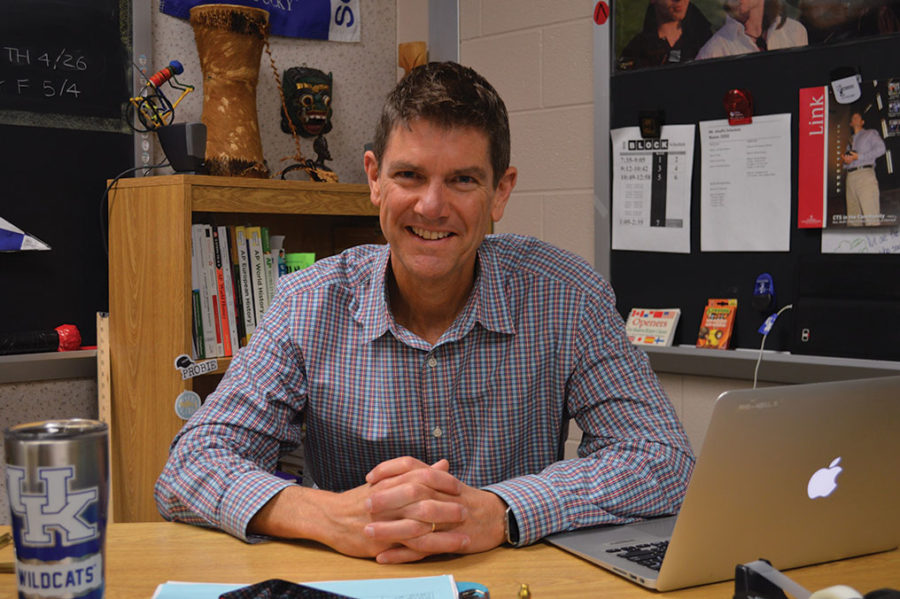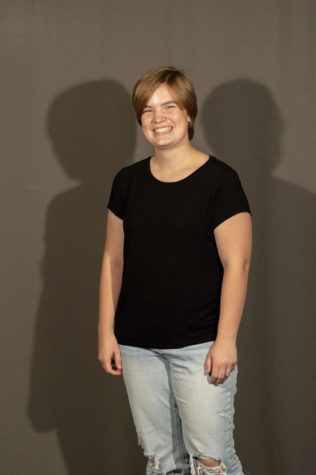Stan the man
May 1, 2018
Banana stickers: Something that one does not often think of when you think about teachers. But this helps paint the picture of Stanley Abell, who currently teaches World History, and European History here at Noblesville.
After starting off his teaching career in Carmel, Abell left teaching for ministry in 2002 after teaching in Carmel for ten years. For those twelve years as a minister, he served at Saint Luke’s United Methodist Church in Indianapolis.
Abell left ministry in 2014, and resumed teaching in March here at Noblesville High School, filling in for a teacher who was taking an emergency medical leave.
“I found out that I was [kind of] in a transition spot in my life. A series of doors began opening from the education world again, and I chose to walk through them,” Abell said.
He applied for a full time job as history teacher four years ago, and has been here as a full time teacher since.
“Noblesville has been wonderful to me and for me it just felt like the right thing to do at the time, and I don’t regret it at this point, because I’ve really in four years come to enjoy this place and the students and my colleagues and the whole community,” Abell said.
Hannah Dwyer, a fellow history teacher, says that if she had to sum up Abell in one word, it’d be supportive.
“I have learned so much. He not only provides help when making lessons, but he is such an awesome person to talk to about life and get advice,” Dwyer said.
And so with the advice he has picked up over the years, Abell is himself.
“Every single day we played Quizlet Live to start class. We were able to review the content we learned in the reading the previous night, before taking a quiz or doing an assignment over it. Mr. Abell would talk and joke with us, while still being able to effectively teach. Also, he has a banana sticker collection…What other teacher has one of those?” Junior Kendra Loos, former AP World History student of Abell, said.
Abell’s banana sticker collection originally began when he wanted a way to segway into his talk about the United Fruit Company’s monopoly of the 1950’s, and now his podium has accumulated over thirty stickers, nearly covering the front.
Abell’s banana sticker collection is just one of the many decorations that are scattered around his classroom, many of which Abell has obtained through his travels.
“I love the grittiness of developing world cities. Every time I go to Haiti, or Kenya, or Guatemala, or wherever it is, I’m reminded that material success does not equal happiness. That there’s an internal happiness that far outweighs stuff that money can buy,” Abell said.
One of Abell’s trips was due to another passion of his: film-making.
“A person at the church that I was serving had a contact with a physician at IU who was heading, there at the time just getting off the ground, a partnership between the IU school of medicine and the Moi Teaching University in Eldoret, Kenya,” Abell said.
This documentary was in the making in 2004, a time when AIDs was particularly bad in Africa. Abell and his group of filmers helped raise awareness and help the Moi Teaching University gain recognition and funding.
“We decided to use our skill set, which at the time was telling a story with video, and that’s what we did. We took a group of about twelve or thirteen people for three weeks and filmed the documentary and submitted it and it actually won a regional emmy,” Abell said.
Along with film making Abell has quite the taste for music and for food.
“My real passion is cooking. If I could do anything on the planet, that’s what I would do. I would become a chef. I’m very good at it. I kinda have this innate [ability] of knowing what goes with what, and I would love to be able to connect with students at that level on showing them how to make really cool food,” Abell said.
Through teaching Abell himself has connected with students and gathered some advice for himself personally as a teacher.
“The most important thing is to be compassionate, to be able to facilitate conversation, not to rule a conversation,” Abell said.
And so that is what Abell is doing outside of the classroom as well as in it. He has recently been taking snippets of his history books and tweeting them, and many people have made the mistake that he had made the tweets up himself.
In reality, he’s using quotes from some five hundred years ago to talk about the current political events.
“It’s crucially important that we understand how things worked in the past, and how things, political, economic, and social, [interact] between people and particular countries, and countries among other countries, [and] how those things [in the past] went down, because some of those same patterns are repeating themselves again,” Abell said.
And just as history is repeating itself, Abell believes that, as antiwar protests were taken up by students in the 1960’s, protests and the leadership of the current problem of gun control and regulation will be taken up by students.
“I can’t help but look back at any significant movement in history [and see that] it was students who were on the front line, whatever that front line was. In my view, I believe it’s students who are currently at the forefront of this conversation, and who will likely move it forward with very powerful voices,” Abell said
Since then, Abell has not made any more documentaries, but he has continued to love his career and all the possibilities it allows, whether it be through current changes or through the events of the past.
“If a movie has been historically vetted as accurate, a well-filmed and well told story has the opportunity to connect students at a visceral, very real level. Movies like Saving Private Ryan. The reason I like that movie is because it tells the story of a real person, and I think students can connect with a real person that walked that path, walked those steps, and I think that makes history real to people,” Abell said.
And even though history does not change, what parts of history that are taught does change, and Abell has seen these changes first hand.
“The AP is placing a stronger emphasis on social history, and I enjoy that,” Abell said. “When I was growing up in high school, that’s what we learned about, is white men fighting in a war, rather than a more holistic approach. I think [now there’s] an understanding that there has been a much richer history than history books have typically portrayed.”




